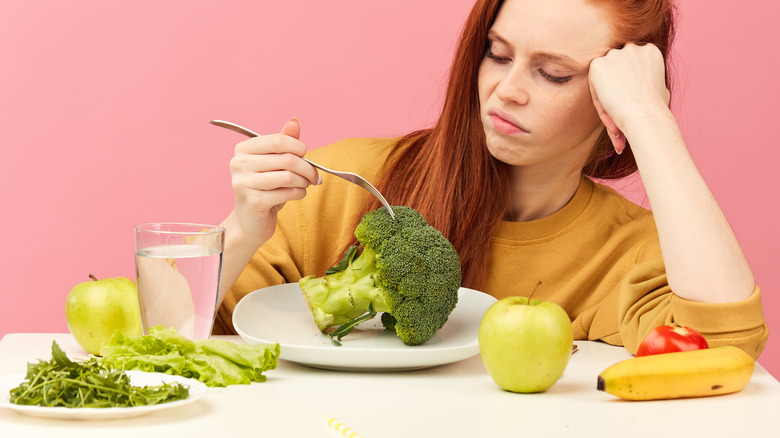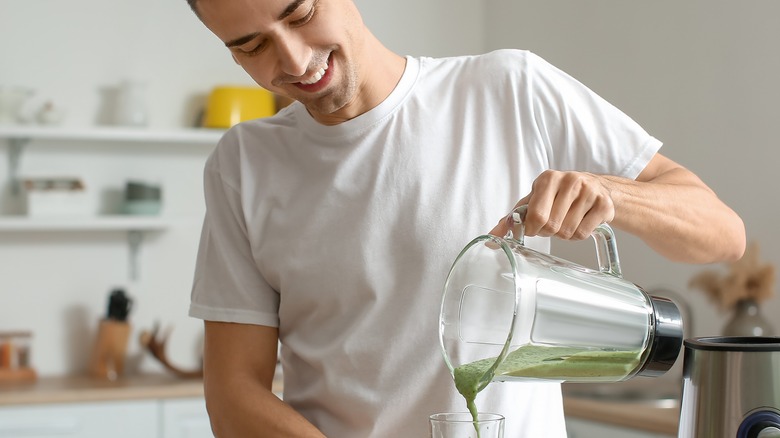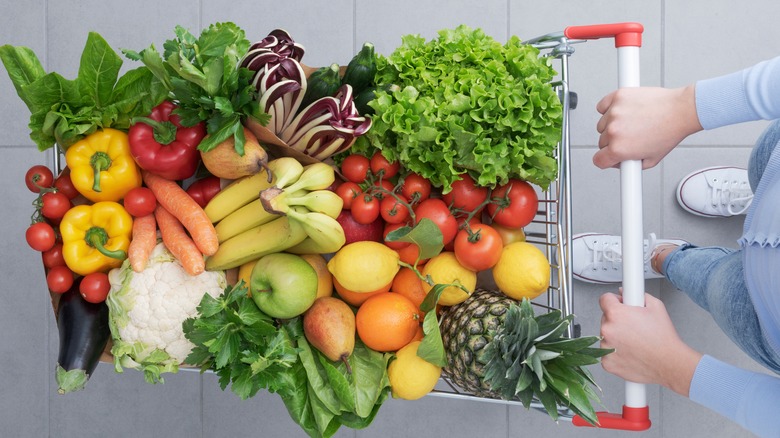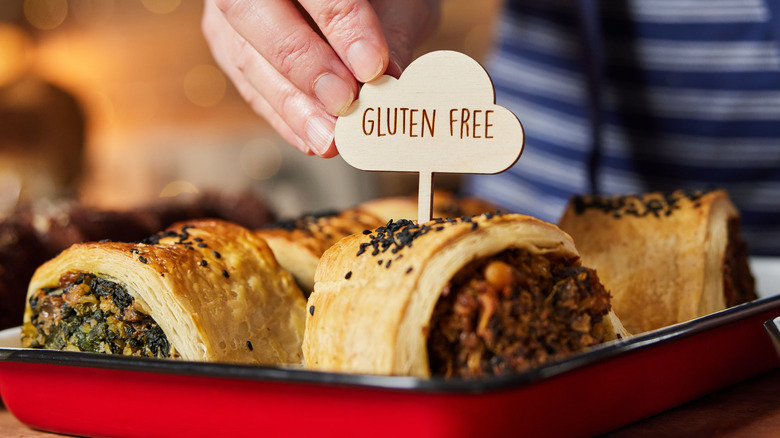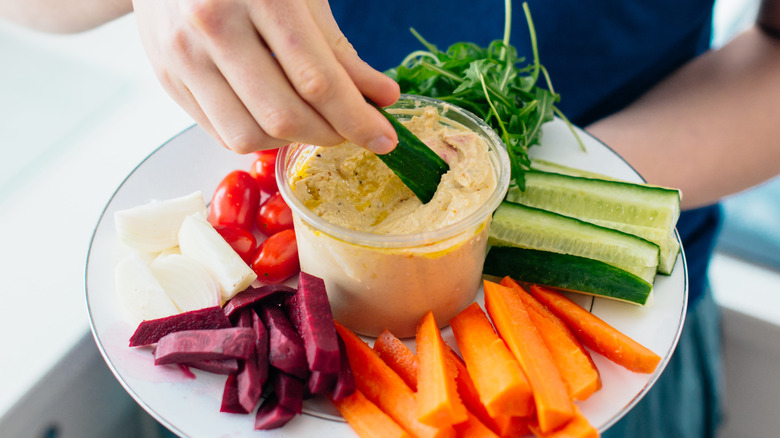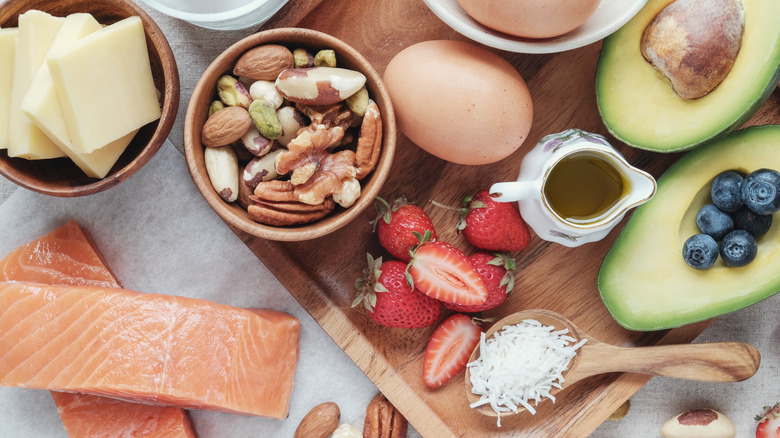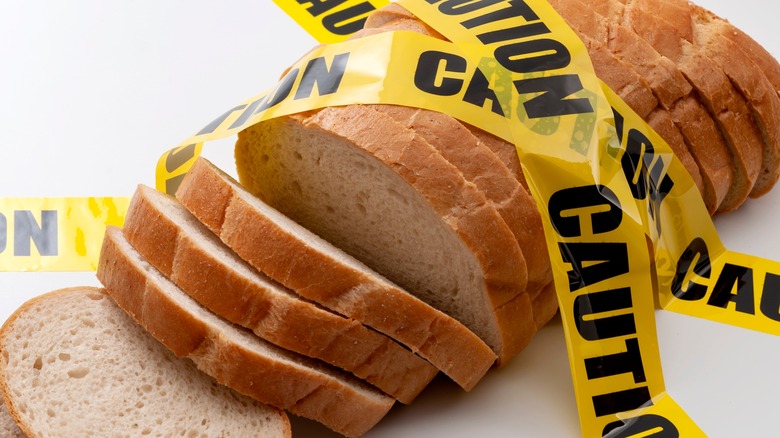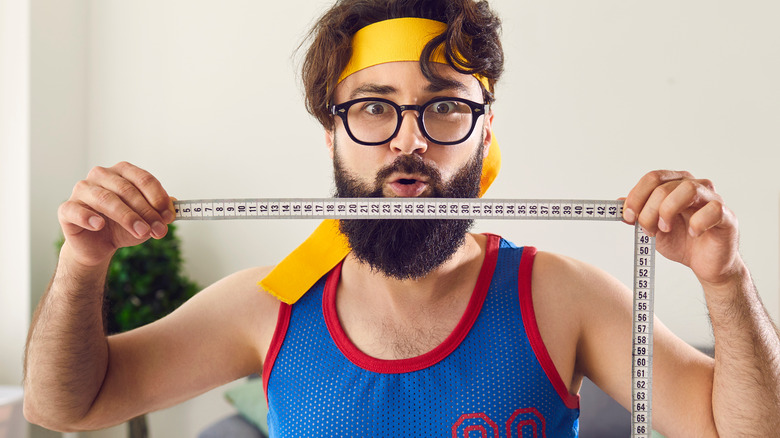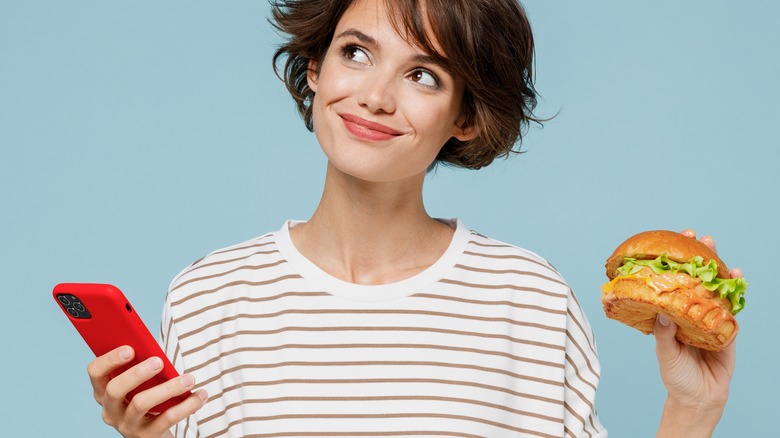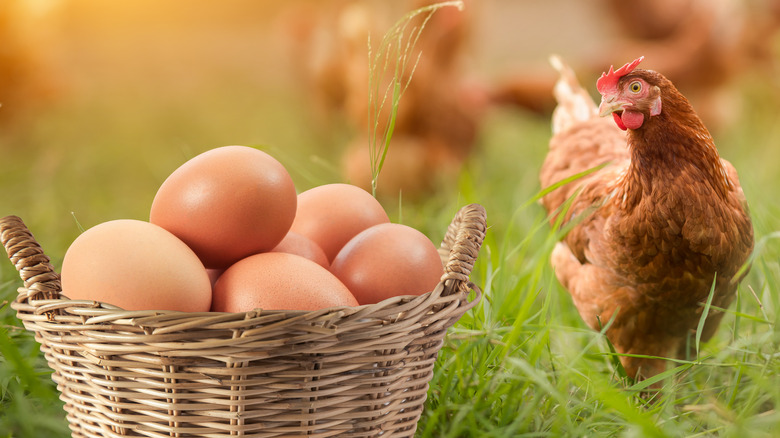Weight Loss Tips You Should Ignore
Questionable weight loss tips have been around for centuries, and there have been some real doozies. Right up there with the wackiest include ingesting pills that have tapeworms in them, smoking cigarettes to stay slim, eating lots and lots and lots of grapefruit (via Good Housekeeping), only eating foods you can pick up with a fork, staring into the sun, pretending to eat without actually eating, and consuming pills that contain arsenic — a chemical used in rat poison (per Best Life Online).
These days, weight loss tips may not be as obviously kooky as, say, inviting tapeworms to take up residency in your gut. But many should still make you think twice before jumping in with both feet, or one fork, as the case may be.
Before choosing a weight loss method, get clear on your weight loss goals, enlist the help and advice of your healthcare provider, and make a long-term commitment to lifestyle changes that will lead to losing your excess weight and keeping it off for good (via the Mayo Clinic).
Ignore: Skip meals
An occasional day when you rush out the door without eating breakfast, or you're so busy at work that you don't remember to have lunch, is no big deal. But missing meals on a regular basis as a way to lose weight is flat-out bad for your health, says Prevention.
Skipping meals leads to a drop in your blood glucose, which can bring on low energy, lightheadedness, dizziness, and grumpiness. You're more likely to overeat at your next meal, or give in to unhealthy cravings because you let yourself get too hungry. And then there's the hunger hormone leptin, which is responsible for telling you when you've had plenty to eat. Unpredictable meal times can cause your body to produce less leptin, so you experience a decrease in your ability to judge whether you're hungry or not.
And what about the theory that breakfast is the most important meal of the day? While many studies seem to show that people who eat breakfast are healthier, WebMD says it's hard to know if those people are healthier just because they eat breakfast, or because they live overall healthier lives than people who don't take time for breakfast. Still, there's no debating the fact that your blood sugar is low when you wake up and a healthy breakfast of grains, fruits, and dairy products helps restock the vitamins and nutrients your brain and muscles need to power you through the coming day.
Ignore: Go on a cleansing or detox diet
Juice cleanses, green tea detox, and detox water are some of the ways of supposedly purging your body of toxins and giving yourself a jump start toward weight loss and better health (via the Cleveland Clinic).
One basic problem with this weight loss tip is that our kidneys, liver, digestive tract, and skin are constantly working to break down toxins and expel them naturally through sweat, urine, and poop. They usually don't need any extra help from a detox diet.
Juice cleanses supposedly power your body with blasts of vitamins and minerals, but any weight loss doesn't usually last. Green tea in moderation has proven health benefits, but it's also caffeinated, so consuming great quantities of it in liquid or supplement forms has the potential to trigger liver disease, bone conditions, and an upset stomach. As for detox water, don't expect it to have any magical, long-term weight loss benefits. Plus, drinking more than 64 ounces of fluid a day may result in flushing out essential salt and electrolytes in your body. Keep an eye on your urine: If it's clear, back off on your liquid consumption.
While ads may claim all kinds of amazing benefits of detoxing, including increased sex drive, Harvard Health Publishing says there's almost no high-quality research proving any of those benefits. And let's not forget that some detox programs are costly, and you may be encouraged to repeat the program occasionally. Cha-ching, cha-ching.
Ignore: Eat as much healthy food as you want
You might think that there's no ceiling on how many fruits and vegetables you can eat and still lose weight, but ScienceDaily makes quick work of giving a big thumbs down to that assumption. Believe it or not, overeating even healthy food can result in weight gain, and portion control is still needed, whether you're eating fruits and vegetables or junk food.
It's also important to pay attention to the calories you're taking in versus the calories you're burning. If you're consuming more calories than you're expending during the day, you may be gaining weight instead of losing it.
ScienceDaily does offer this one semi-bright spot, if you like rugged vegetables: If you focus on eating nonstarchy vegetables such as broccoli, asparagus, cauliflower, greens, and Brussels sprouts, you're probably safe to eat as much as you want because of the vegetables' high water and fiber content. But you can't be drowning the vegetables in butter, cheeses, and sauces. If the nonstarchy vegetables named here don't have you running eagerly to the store, check out the more thorough list provided by the University of Michigan Comprehensive Diabetes Center.
Ignore: Go gluten free
If you don't have celiac disease or nonceliac gluten sensitivity, there's little evidence that a gluten-free diet has any health benefits, says Medical News Today. But that doesn't stop millions of people from following a gluten-free diet and claiming that their gastrointestinal health has improved.
If a gluten-free diet seems to be helping you lose weight, it may be because you've eliminated the refined carbohydrates and processed foods that contain gluten (via Johns Hopkins Medicine). But you may be lacking the fiber, whole grains, and micronutrients that fend off diabetes and heart disease. Also, beware of products that boast being gluten-free but are not free of sugar, fat, and sodium. Eating those can actually result in weight gain, higher blood pressure, and other health problems.
Before going gluten-free, Johns Hopkins Medicine recommends adding more whole-grain pasta and bread, lean proteins, fruits, and vegetables to your diet, and removing highly processed foods.
Ignore: Don't snack between meals
Proponents of skipping snacks as a weight loss technique do offer up some decent arguments for their opinion (via the Harvard T.H. Chan School of Public Health). For example, if you choose low-nutrient, highly processed foods that contain sugar, fat, and salt, you may fill up so much you might skip your next meal. And if you're not applying savvy portion control, weight gain may be more likely than weight loss.
On the other hand, proponents of snacking – healthy snacking, that is — say that it can boost your blood sugar between meals when it's flagging, renew your energy, provide high-quality nutrients, and keep you from overeating at the next meal. But you have to choose your snacks carefully, and not just grab the nearest candy bar or bag of chips.
Snacks that contain both protein and carbs will have the best lasting power, says MedlinePlus: Plain yogurt and fresh fruit, an apple and string cheese, carrots and hummus, or peanut butter and whole wheat crackers are a few of their suggestions.
The Nutrition Facts label on packaged food can help you determine if a snack is healthy. Evaluate the amount of fat, sodium, sugar, and calories in a potential snack, and don't forget to check the serving size. If you know you're going to eat the whole package rather than a single serving, you need to multiply the nutrition information accordingly.
Ignore: Choose fat-free products
Avoiding full-fat foods as a weight loss approach seems so logical, but a closer look may cause you to reconsider. According to The University of Chicago Medicine, fat-free or low-fat food products may not contain much or any fat, but they're mostly likely packed with carbohydrates. And when you eliminate fat, you may also eliminate protein, fiber, and amino acids that your body needs. Because protein and fiber take longer to digest than other foods, they help you feel full longer. And a high-fat diet, in moderation of course, may contribute to improved heart health.
WebMD brings up another good point: Fat-free foods tend to be taste-free, so manufacturers add salt, sugar, and thickeners like flour to the ingredients, and — poof! — you've just gotten your calories back. Instead of focusing on food products claiming fat-free benefits, choose healthy-fat foods such as salmon, sardines, avocados, beans, eggs, olive oil, seeds, and nuts. Even with these foods, moderation is the key, so stay vigilant to portion control.
The thing to remember, says BBC Good Food, is that healthy fats help us absorb certain vitamins, keep our nervous system functioning properly, maintain healthy blood vessels, and even boost bone health and immunity. But apply good sense to this concept. Steam, bake, poach, or grill foods instead of frying. Use plain yogurt instead of mayo, or a squeeze of lemon or lime juice. And trim visible fat from meat.
Ignore: Drink diet soda rather than regular soda
Just because diet soda has the word "diet" in its name doesn't mean it's a health food, or necessarily a smart addition to your weight-loss effort (via Live Science). Sure, the drinks contain fewer calories — as in none — than regular sodas, but they also don't offer any nutritional value.
Some studies suggest that artificial sweeteners send signals to our brains, just like sugar, that make us crave more sweets (and can lead to weight gain rather than the reverse), says Health and Wellness. There are also concerns that diet drinks may increase your risk of diabetes, heart disease, strokes, and Alzheimer's disease.
The artificial sweeteners used in soft drinks — including sucralose, saccharin, and aspartame — are considered to be safe by the Food and Drug Administration (FDA), says the PBS News Hour. But before you put much stock in that ruling, it's important to understand that the FDA's tests are looking for "gross abnormal outcomes." Whether diet drinks are actually healthy for you on an ongoing, cumulative basis is not part of their evaluation.
A study published in JAMA Network Open (via WebMD) may interest you if you're a woman, a person challenged by obesity, or both. It found that these groups of people are more sensitive to the artificial sweetener sucralose, and it may make them feel hungrier.
Ignore: Jump on the fad-diet bandwagon
A fad diet is one of those diets that promises to make all your weight-loss dreams come true, quickly and with seemingly little effort. They might call for eliminating carbs or protein, investing in dietary supplements or meal-replacement products, or stoking yourself full of a single food such as grapefruit or cabbage. Oh! And they probably don't mention any need for calorie-burning exercise (via Banner Health).
Fad diets usually focus on a speedy solution to weight loss, whereas successful, long-term weight loss is based on a commitment to changing your lifestyle and eating habits for good, so you can keep the weight off. The deprivation these diets require may lead you to binge eating that has you gaining the pounds you lose right back.
Beware of diets based on a single study that wasn't peer reviewed, or diets that make dramatic claims without respected medical or scientific sources substantiating them, says the Cleveland Clinic. Supposed testimonials are another red flag, as are diets that promote the purchase of a book or product.
When in doubt, just stick to the basics: Eat moderate portions of a wide variety of unprocessed or lightly processed foods, and exercise regularly.
Ignore: Eliminate carbs
Restricting carb consumption is a popular way to lose weight, and it may indeed help you drop some extra pounds. Cutting back on carbs can also decrease your risk of type 2 diabetes and heart disease (via the Mayo Clinic). All good, right? Not so fast.
The Dietary Guidelines for Americans recommends that 45% to 65% of your calories — or between 900 and 2,000 calories a day — come from carbs, compared to 80 to 240 calories recommended for low-carb diets. Going from plenty of carbs to limited carbs can cause muscle cramps, constipation, and headaches, and eventually lead to mineral and vitamin deficiencies. And very limited carb intake can cause ketosis, where your body starts breaking down fat to make energy. That may sound like a positive thing, but side effects can include weakness and fatigue, and even bad breath, of all things. The other downside of limiting carbs is that you're probably going to eat more fat and protein from animal sources, which can increase your risk of certain cancers and heart disease.
Rather than banning all or most carbs from your diet, select nutrient-rich carbs that are packed with vitamins, minerals, and fiber, and not with a lot of sugar, says the Cleveland Clinic. Don't throw out the baby with the bath water — just make smart choices.
Ignore: Weigh yourself daily
Granted, there's quite a bit of debate over whether weighing yourself daily is a good or not-so-good weight loss tip, and it seems to depend a lot on your reaction to the numbers you see of the scale (via The Washington Post). So maybe this tip goes in the "may be best to ignore" category.
Some people find it motivating to know whether they're weighing more or less each day. Others react emotionally to the numbers, and may feel discouraged or hopeless if the numbers are heading upward. So, whether to weigh every day or not can be considered a personal decision.
One reason not to put too much weight (pun intended) on the scale reading is that your weight fluctuates throughout the day, says Medical News Today, even two to four pounds over a few days. Reasons can include water retention, certain medications, and hormonal changes such as menstruation. If you're intent on weighing yourself daily, you'll get the most consistent and accurate readings possible by weighing yourself first thing in the morning, after you go to the bathroom, and before you eat or drink anything.
The Washington Post suggests that there are other ways to measure your weight loss progress besides stepping on the scale. One is to choose an item in your closet that you love but can't wear because it's too snug. Try it on once a week until it fits comfortably. Then, repeat the process with a smaller item of clothing.
Ignore: Count your calories
Counting calories is a weight loss technique that's been around for ages and should be promptly thrown out the window, says Harvard Health Publishing — not exactly in those words, of course. The reason is that all foods and calories are not created equal, and your body burns them differently and metabolizes them differently, depending on whether you're eating oatmeal, a chocolate eclair, or carrot sticks. What's more, every person's body uses foods differently, so generalizations just don't wash on this one.
HuffPost uses the example of two fun-size bags of M&Ms and two hard-boiled eggs. They have the same number of calories, but the M&Ms are mainly sugar, and will spike your blood sugar then send it crashing. The eggs, on the other hand, contain healthy fat and protein that will nourish your body and keep you satisfied much longer.
Counting calories tends to focus your attention on math, rather than on choosing high-quality foods that provide good nutrition. You may lose sight of when you're hungry and when you're not, and what satisfies and you what doesn't. And you might even eat a snack at bedtime — not because you're hungry, but because you still have some calories left over for the day.
Ignore: Only eat protein
You'll probably lose weight on a high-protein diet that limits your carbohydrates, but you may end up eating red meats and processed meats that are high in saturated fat (via the Mayo Clinic). This can increase your LDL "bad" cholesterol and your risk of heart disease. It can also put a strain on your kidneys as they try to rid your body of the waste products from all that protein, and put you at risk of kidney stones (via Harvard Health Publishing).
If you're still sold on a high-protein diet, steer clear of health hazards by focusing on healthy protein sources such as salmon, dairy products, and lean chicken and turkey. Consume protein throughout the day, balanced with fruits and vegetables and plenty of fiber sources. Harvard Health Publishing recommends the Mediterranean and DASH diets as healthful approaches.
Because grains are limited in many high-protein diets, choose yours carefully, says WebMD. Whole grains will give you the most nutrients and fiber, but make sure the products don't contain a lot of fat or sugar. And don't forget eggs, soy, and beans as protein sources. You'll get as much protein from a cup and a quarter of beans as you get from a broiled steak, and beans have the added benefit of lowering your LDL cholesterol and keeping you feeling full.

